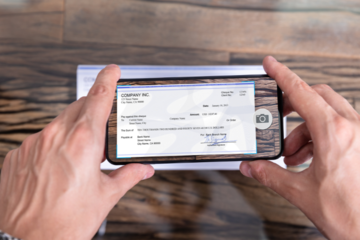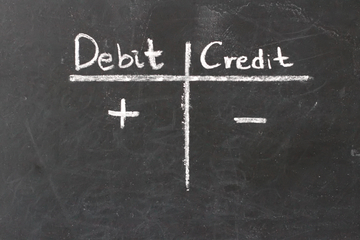Living paycheck to paycheck can be frustrating as you watch money go out as soon as your paycheck comes in. You're staying on top of bills and working hard but need help to look forward to a time when you can put money away.
An inability to save puts people in a tough spot when an emergency occurs. A surprise car repair or medical bill could become very problematic.
61% of Americans were living paycheck to paycheck in June 2022, up 9% from an April 2021 low of 52%, making paycheck to paycheck living the most common financial lifestyle in the US. Some simple money management tips can bring you out of the paycheck to paycheck grind, put some cash away, and be prepared for when emergencies might come your way. You've got this.
How to Create a Budget
Saving money starts with knowing where it's going. Tracking bills and other expenses like groceries begin the budgeting process. You'll see where your money is going and possibly reveal spending you never knew had been hurting your pocketbook.
You can use a spreadsheet, an app, or any number of free tools to create your budget. A budget can be as simple as using Google Sheets to record who is paid, when they're paid, and the amount they're paid. Then enter your income after taxes and start subtracting the expenses. Start with the essentials of food, shelter, transportation, and utilities before moving on to other spending.
As you track your expenses and find out where your money is going, you can plan and identify spending that can be reduced or cut.
Look at you taking control and saving money now. Good job!
Should You Open a Savings Account?
While starting to cut some spending with your new budget, why not include monthly savings? Six in ten Americans don't have $500 in savings , meaning an unexpected bill or expense could be traumatic. How would you feel knowing you had $1,000 put away for a rainy day? Saving $20 a week will get you there.
Having a savings account can be a tremendous stress reliever. Knowing there is a backup when the need arises and you're in charge of your finances feels excellent.
If you've ever asked yourself how to save money, it isn't hard; putting money away by just setting up a small regular deposit is easy. It could be $2 a day or $15 weekly; before you know it, you're on your way.
Most banks will offer savings accounts with no monthly fees if automatic transfers from your checking account are set up. The amounts can be small and still make a difference, and you'll be happy about headway being made every week.
Can You Renegotiate Bills?
Some monthly bills can be renegotiated or lowered if a competing provider exists in your area. Companies know it is better to discount your service than lose you to a competitor. They often have "save" agents in their call centers that are empowered to offer discounts to keep your business.
The types of bills that offer the most significant potential for negotiation success are:
A quick call and the statement, "I am considering switching to your competitor," could set you up for some savings. It helps to have researched who the competition is, the deals they offer to switch, and the new packages your current provider might offer.
Plan Accordingly
Transitioning from living paycheck to paycheck comes down to one thing more than anything else; the willingness to make a plan you stick to. It's not always easy, and if you end up on the wrong path once in a while, don't worry. We all do it. Just get back on track when you can.
Needs and Wants
Budgeting and adhering to your plan is an exercise in trade-offs. Unless we're tech billionaires, we all have to manage needs versus wants. Often that trade-off is not purchasing that shiny new thing to know the bills are paid, and we have some extra funds sitting in the savings account.
It's a good trade-off. You have enough stress, and seeing a healthy bank account is a tremendous stress reliever. Treat yourself occasionally, get that shiny new thing or have a great night out.
Bills
The nice thing about bills is that they are usually predictable. Internet, utilities, cell phones, and your mortgage or rent tend to be the same month after month. In your budgeting, you identify your regular bills and know how much of each paycheck is budgeted to pay them. It feels excellent every month, knowing they are covered.
Seeing a late notice is an experience you'll never miss.
Emergency Fund
The best outcome of your budgeting and planning is watching that little savings account become a bigger and bigger savings account. When that unexpected car repair comes along, you don't have to sweat how you will pay. Few things feel better than knowing you're prepared for whatever comes your way.
Commit to ongoing deposits and resolve to only access the account when necessary. When an emergency comes, and you've got it handled, smile really big and congratulate yourself for being awesome.
Summing It Up
Getting out of the paycheck to paycheck grind feels fantastic, and you're rewarded every day with less stress and the knowledge that you're the one in control, not your bills. It is as simple as putting together a basic budget, keeping it updated, planning ahead, and committing to a small regular savings deposit.
Once your saving and budgeting become habits, you'll feel like a money superstar.
FAQs
How do I open a savings account?
Many options exist for opening a new savings account. Starting with your current bank is a great option, but many online banks are outstanding. If you have an online account that money gets transferred to daily or weekly, it's easy to forget it is there and just let it build up.
You may open a new savings account online, in person, or by phone with your proper identification (SSN/tax ID and government-issued ID). Just choose if you want an individual or joint account, submit your application, and set up how you want it regularly funded.
Funding can be as simple as directing part of your paycheck direct deposit to deposit a preset amount every payday or having the account transfer funds regularly from your checking account.
What is the best way to budget?
As mentioned above, there are plenty of options and no one perfect way. It comes down to the method you know you'll keep up with and use for regular planning. For some great ideas, check out our article, which gives you some different budgeting methods. You've got this!
There can be times when our very best budgeting and planning efforts fall short of helping with an emergency bill or need. Apply through Integra Credit for loan products that can help you get back on track during a stressful time.
Sources
https://www.cbs19news.com/story/34248451/6-in-10-americans-dont-have-500-in-savings



